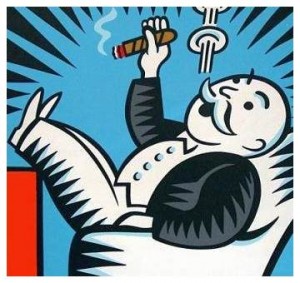Will Bunch is always worth a close read, and his piece in the 12 May Philly Inquirer (h/t to anonymous in the Thursday Open Thread) is no exception. I’ve had this open in a tab since last night and have been thinking alot about his question: Money monster: What if the problem’s not the candidates but capitalism?
Taking a look at 3 clear trends — the reduction in retail jobs because of more online shopping; the worldwide reduction in manufacturing jobs due to better productivity (read: machines) and the easy disrespect of American workers (especially low skilled ones) exhibited by employers — Bunch wonders if we aren’t as much dissatisfied with our candidates (and their proposed solutions) than we are unhappy the very broken state of capitalism. That’s a great question. I’ve noted frequently that Bernie and Trump supporters are have similar economic anxieties, but with very different reasons for and approaches to fixing those anxieties. Bunch cites Time Magazine asking this question:
This crisis of faith has had no more severe expression than the 2016 presidential campaign, which has turned on the questions of who, exactly, the system is working for and against, as well as why eight years and several trillions of dollars of stimulus on from the financial crisis, the economy is still growing so slowly. All the candidates have prescriptions: Sanders talks of breaking up big banks; Trump says hedge funders should pay higher taxes; Clinton wants to strengthen existing financial regulation. In Congress, Republican House Speaker Paul Ryan remains committed to less regulation.
All of them are missing the point. America’s economic problems go far beyond rich bankers, too-big-to-fail financial institutions, hedge-fund billionaires, offshore tax avoidance or any particular outrage of the moment. In fact, each of these is symptomatic of a more nefarious condition that threatens, in equal measure, the very well-off and the very poor, the red and the blue. The U.S. system of market capitalism itself is broken…
He sums up:
Maybe now it makes sense that voters respond so well to Bernie Sanders’ call to break up the big banks, even if the details are fuzzy. Not to mention Trump’s talk on trade, not that I think that’s the main reason for his support. But for all the horrible things that we’re saying about the 2016 race, the scariest thought may be a thing that we’re not even talking about. What of the likelihood that the next president — regardless of who he or she may be — can do almost nothing to stop the slow, steady rot of capitalism as it’s practiced in the 21st Century?
You think the torches and pitchforks are out now? Wait until 2020.
Interesting. But I’d specifically put the finger on the failure of crony-capitalism — the bought and paid for government support of a system of commerce that is only concerned for itself and is meant to benefit the 1%. This is the system that Ronald Reagan started making possible (with Democrats following along). I’m not sure that we’ve ever lived with laissez faire capitalism, but for much of the 20th century, American economic policy specifically privileged the building and maintenance of a middle class. 30+ years after Reagan started privileging businesses (and the government) in this equation, we are at the point where the middle class is officially shrinking. Which for middle and working class people, feels like the American Dream is more of a reach because the structural inequality and more restrained economic mobility is now baked in the cake. That, of course, benefits the 1%, but does not benefit (and provides no incentives to benefit) the people who are creating all of this value.
I’m not entirely certain how to fix it. This did not happen overnight and won’t get fixed overnight. Reducing the amount of money Americans pay for health care is one piece. Eliminating tax policy that provides a reduced rate to those in the shadow banking business is another. Stop incentivizing the movement of companies overseas. Stop incentivizing the mistreatment of labor. Stop subsidizing low wage work. Insist on corporations paying their fair share of taxes. Take on an investment in infrastructure like it was the old race to the moon.
More?
